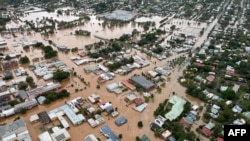Human Rights Watch says Australian and New South Wales officials failed "to take effective steps" to help its most at-risk population "from foreseeable harm" during a flood in February in the New South Wales town of Lismore.
The human rights group said in a statement Thursday that officials failed to provide "adequate flood warnings, evacuation, or rescue support, leaving older people, people with disabilities, and those who were pregnant facing life-threatening circumstances with little government assistance."
Four Lismore residents drowned in the flooding, and more than 2,000 houses became uninhabitable.
"Such extreme weather events," HRW said, "are likely to begin happening more frequently as a result of climate change conditions.
Although "no conclusive evidence attributes the 2022 floods to the climate crisis," HRW reported, the "the Intergovernmental Panel on Climate Change (IPCC), the world's leading scientific body on climate change, projects an increase in more extreme rainfall events and flood magnitudes in eastern Australia due to warming temperatures."
The report said that Australia has a "human rights obligation" to help at-risk groups in extreme weather circumstances because Australia in a top greenhouse gas emitter and fossil fuel producer.
HRW reported that emergency workers knocked on people's doors and told them to leave, but offered no transportation assistance, "leaving families with small children, older people, and people with disabilities unable to leave."
One 24-year-old man said he risked his life to save a 91-year-old woman, after failing to reach anyone at NSW's designated emergency phone number. "That was the scariest thing ever," he said.
Emergency services said its phone system was overwhelmed by the phone calls and stopped working.
"Climate change exacerbates inequalities, and the failures seen in Lismore highlight the urgent need for the authorities to ensure inclusive climate action and planning," said Sophie McNeil, an Australia researcher at HRW.





